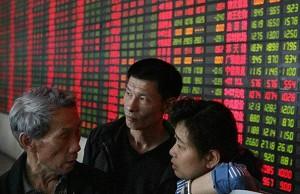At 12:09 a.m. on May 30, China’s Ministry of Finance suddenly announced its measure to raise stamp taxes on stock transactions from 0.1 percent to 0.3 percent. The news was announced by the state-run media, Xinhua News. The Ministry of Finance increased stamp taxes twice, and the measure caused stocks to plunge over 6 percent after the stock markets opened in Shanghai and Shenzhen on May 30.
The incident caused a shockwave of reactions among investors. Investors, who as a result, suffered a heavy loss, labeled the huge change in stock prices the “5-30 Tragic Event.” Many investors lost control of their emotions and are blaming the Ministry of Finance. Some investors launched a signature campaign asking for the impeachment of the Minister of Finance.
Some investors from Beijing, Shanghai and other places travelled to Tiananmen Square, the organizations of the Financial systems in Beijing and the Shanghai Securities Monitoring Department to protest. Other investors made their own banners displaying innuendoes against the government for not to keeping its promise.
In addition, on the afternoon of May 30, the website of the Ministry of Finance was down for seven hours, only reporting back with the message “unable to find server”. Investors speculate that this was also related to the sudden increase in stamp tax by the Ministry of Finance.
An Epoch Times reporter called the website maintenance center of the Ministry of Finance, and staff working there confirmed that the website had been down, but was now operating properly. When the staff member was asked whether the website had been under attack, he said “It is possible.”
Shanghai investor Mr. Xiao revealed that a rumor predicting the increase in stamp tax spread quickly in the markets last week, but the Directors of the Ministry of Finance and the State Administration Department all claimed that they had never heard of such a planned adjustment to the tax on stock transactions when they were interviewed by mainland Chinese media.
Mr. Yang from Beijing told The Epoch Times that at about 10:00a.m. on May 30, more and more people gathered at Tiananmen Square and that there were several thousand people there in the afternoon. These people expressed their dissatisfaction, complaining that the government was cheating the public and not being responsible to its people.
Some investors said, “The government is relying on making money through increasing tax revenue; it is similar to their actions in taking away peoples’ lands.”
There are over one hundred million Chinese investors, but the Chinese Communist Party (CCP) constantly worries about them and about the fact that the stock market might become China’s “unstable factor.” Mr. Yang said, “The government does not have the power to manage this; it is out of control now, and they are just desperately trying anything that they think might help.”
As mentioned by investor Ms. Fang, over one hundred people went to the Beijing Xicheng District Sanlihe to protest in front of the Ministry of Finance on May 30. They held banners and slogans, calling the Director of the Ministry of Finance to come out to meet with them. They were obstructed by police later on.
Mr. Jian from Shanghai said that on May 30, a couple hundred people went to the Shanghai Securities Monitoring Department to demonstrate. Filled with resentment, some investors stated, “How do they explain their so-called ’refuting a rumor' seven days ago? Shouldn’t they explain it to the whole country?”
At present, the number of individual investors who invest in Chinese stock markets is increasing tremendously. Official data shows that the total number of accounts from both the Shanghai and Shenzhen stock markets was over one hundred million at the end of the trading day of May 28.



